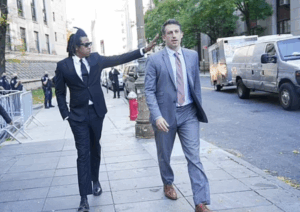National Guard troops have entered Washington DC following President Trump's controversial decision, leading to local officials asserting that crime levels are under control and criticizing the federal action as authoritarian. The situation remains tense as law enforcement engages with rising criminal incidents in the area.
Tensions Rise in Washington DC as National Guard Troops Deploy Amid Crime Disputes

Tensions Rise in Washington DC as National Guard Troops Deploy Amid Crime Disputes
The deployment of National Guard troops in Washington DC has sparked controversy, with local officials denouncing it as an overreach amidst a heated debate over crime levels.
As President Donald Trump ordered National Guard troops to Washington DC, claiming there was an urgent need to address violent crime, controversy erupted over the necessity and implications of the decision. The deployment of approximately 800 National Guard personnel, supported by 500 federal law enforcement agents, followed the President's assertive response to crime, which he argued was spiraling out of control.
On the streets of the capital, armored vehicles appeared at urban hotspots and tourist attractions on Tuesday evening, forming a visible military presence. Washington DC Mayor Muriel Bowser, a Democrat, reacted sharply, labeling the troop deployment as an "authoritarian push" and contending that crime levels in the city do not warrant such drastic measures.
Discontent simmered as Trump threatened similar actions in Democratic-run cities like New York and Chicago. The camouflaged soldiers began rolling into the city following Trump’s announcement, erecting barricades and interacting with tourists. Monday night saw the arrest of 23 individuals by federal agents for several serious offenses, including homicide and drug-related crimes.
White House press secretary Karoline Leavitt informed the public that this operation was merely the onset of a broader strategy to tackle crime in the city. FBI Director Kash Patel confirmed that many of the recent arrests involved federal agents, reflecting a partnership with local authorities. Both Mayor Bowser and the city's police chief recognized a shared aim with federal agents to enhance public safety.
However, at a town hall meeting, Mayor Bowser intensified her opposition to the federal move, calling on residents to defend the city’s autonomy in light of the President’s actions. The ongoing tension was underscored by a recent homicide in the city, highlighting concerns regarding safety in the midst of political strife.
While statistics indicate a notable drop in violent crime throughout the past year, the narrative remains contentious. DC Police Union chairman Gregg Pemberton has challenged the portrayal of crime statistics, alleging misrepresentation by the police department. Meanwhile, the situation continues to escalate as residents and officials navigate the implications of federal intervention in local law enforcement.





















